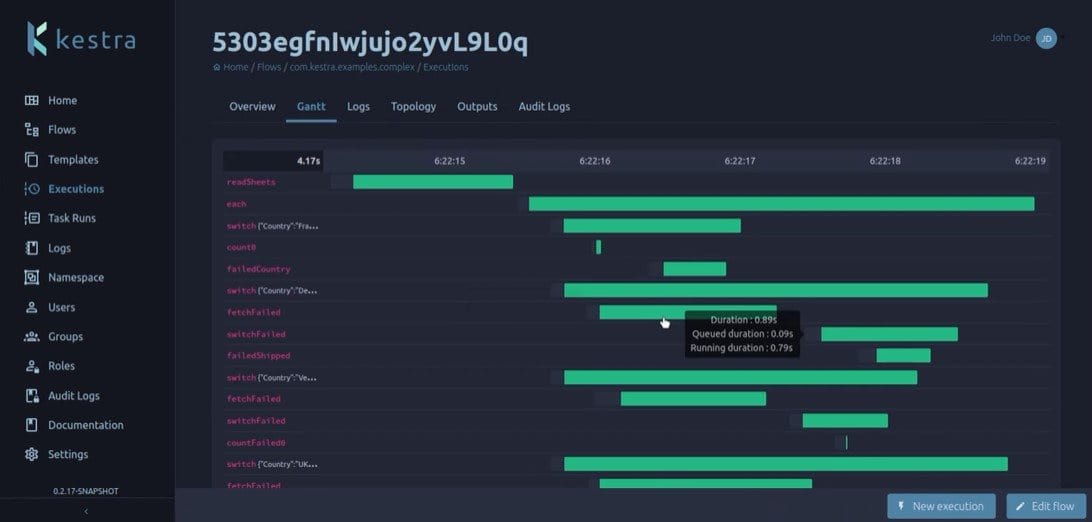Deploy Kestra [Updated Feb ’26]
Kestra [Feb ’26] (Data Pipelines/Task Runner/Orchestration Engine) Selfhost
kestra-railway
Just deployed
/data
Just deployed
/var/lib/postgresql/data

Deploy and Host Managed Kestra Service with one click on Railway
Kestra is a powerful, open-source orchestration and workflow automation platform available on GitHub. It allows you to design, schedule, and monitor data pipelines and automation tasks at scale. With Kestra, you can integrate multiple systems, APIs, and processes into a single, reliable workflow, all while leveraging modern technologies like Docker and Kubernetes.
About Hosting Kestra on Railway (Self Hosting Kestra on Railway)
You can self host Kestra to take full control over your workflow orchestration setup. By hosting Kestra on Railway, you eliminate dependency on third-party providers and retain full ownership of your pipelines, schedules, and logs.
Railway provides the perfect managed environment for self hosting Kestra. It streamlines the deployment process, offering automated scaling, built-in monitoring, and secure containerized hosting.
Why Deploy Managed Kestra Service on Railway
Deploying a managed Kestra service on Railway removes the complexity of infrastructure management. You get the flexibility of self hosting Kestra with the ease of a fully managed cloud service.
Railway vs DigitalOcean:
While DigitalOcean requires manual server setup, patches, and monitoring to self host Kestra, Railway allows instant Kestra deploys with no sysadmin burden. Scaling and monitoring are handled for you.
Railway vs Linode:
Linode involves detailed configuration for storage, networking, and updates when hosting Kestra. Railway, on the other hand, automatically manages containers, updates, and scaling, making Kestra orchestration far simpler.
Railway vs AWS Lightsail:
AWS Lightsail adds unnecessary networking complexity and manual scaling. Railway simplifies deployment with secure, managed Kestra instances that auto-scale without extra setup.
Common Use Cases for Kestra
Here are 4 common use cases for Kestra orchestration:
- Data Pipelines: Automate ETL (Extract, Transform, Load) processes across databases, APIs, and data warehouses.
- Machine Learning Workflows: Orchestrate ML model training, evaluation, and deployment pipelines.
- Infrastructure Automation: Automate provisioning, scaling, and monitoring tasks with Kestra workflows.
- APIs and Microservices Coordination: Chain multiple APIs and microservices into cohesive workflows.
Dependencies for Kestra hosted on Railway
To host Kestra on Railway, you’ll need a PostgreSQL database for persistence and optional Redis for queueing. Railway provides these as managed add-ons, simplifying your setup.
Deployment Dependencies for Managed Kestra Service
- Postgres: Required to store workflows, execution logs, and metadata.
- Redis (Optional): For managing distributed queueing and scheduling.
- Docker: Kestra runs in secure Docker containers, making deployments reliable and repeatable.
Implementation Details for Kestra Workflows
When deploying Kestra, you configure environment variables such as:
KESTRA_DATABASE_URL→ Connection string for Postgres.KESTRA_QUEUE_TYPE→ e.g., Postgres or Redis for execution queues.KESTRA_INDEXING_TYPE→ Used for search and indexing of workflows.
How does Kestra compare to other workflow platforms?
Kestra vs N8n
Kestra focuses on developer-first orchestration, with YAML workflows and deep integration for data and infrastructure. N8n is a no-code automation tool better suited for quick integrations. If you want production-grade orchestration, Kestra is the winner.
Kestra vs Apache Airflow
Airflow is powerful but has a steep learning curve and complex deployments. Kestra provides the same orchestration power with a more modern, YAML-based, and container-friendly setup.
Kestra vs Dagster
Dagster is data-centric with a heavy focus on type safety. Kestra prioritizes orchestration simplicity, with less overhead in setup and execution.
Kestra vs Temporal
Temporal is focused on durable microservices orchestration, whereas Kestra is a more general-purpose workflow orchestrator with a simpler deployment model.
Kestra vs Argo Workflows
Argo Workflows is Kubernetes-native and tightly coupled with Kubernetes clusters. Kestra can run on Kubernetes too, but it’s more flexible for hybrid deployments and simpler for small-to-medium setups.
How to use Kestra?
- Define workflows: Write YAML files describing tasks, schedules, and dependencies.
- Deploy Kestra: Use Railway’s one-click deploy or Kestra Docker images.
- Run tasks: Tasks can be scripts, SQL queries, HTTP requests, or custom Python jobs.
- Monitor execution: Use the Kestra web UI to monitor workflows, logs, and failures.
- Integrate APIs: Connect Kestra workflows with external APIs, databases, and services.
How to self host Kestra on other VPS?
Clone the Repository
Download Kestra from GitHub using https://github.com/kestra-io/kestra.git.
Install Dependencies
Ensure Docker and Postgres are installed on your VPS.
Configure Environment Variables
Set values for KESTRA_DATABASE_URL, KESTRA_QUEUE_TYPE, and others in your .env file.
Start Kestra with Docker
Run the Kestra Docker container and link it with your Postgres instance.
These steps work on any VPS, but Railway makes it instant with one-click deploy.
Features of Kestra
- YAML Workflows: Simple, readable workflow definitions.
- Docker Integration: Run tasks in isolated containers.
- Scalable Orchestration: Handle thousands of workflows reliably.
- UI Monitoring: Web interface for logs, executions, and workflow management.
- Extensible Tasks: Run SQL, HTTP, Python, shell scripts, and more.
- API-first Design: Control workflows via Kestra API.
- GitHub Integration: Manage workflows via GitOps with Kestra GitHub repository.
Official Pricing of Kestra Cloud service
Kestra offers a cloud version with pricing based on workflow executions and resource usage. While exact pricing may vary, cloud plans provide managed hosting, scaling, and enterprise support. [Updated Oct ’25]
Self hosting Kestra vs Kestra Cloud Plans
- Self hosting Kestra: Free, with full control over orchestration, but requires you to manage updates and scaling.
- Kestra Cloud: Paid plans offering automatic updates, scaling, and enterprise-grade support.

Monthly cost of Self hosting Kestra on Railway
Self hosting Kestra on Railway typically costs $5–$10 USD per month for the app instance, plus extra for Postgres and Redis add-ons. Even with scaling, it remains cheaper than most managed orchestration platforms.
FAQs
What is Kestra?
Kestra is an open-source orchestration and workflow automation platform, designed for data pipelines, infrastructure automation, and API-driven processes.
How do I self host Kestra?
You can self host Kestra by deploying the Docker container and linking it to Postgres. Railway makes this a one-click deploy with managed services.
What are Kestra’s main features?
Kestra provides YAML workflows, Docker task execution, Postgres persistence, UI monitoring, and API-first orchestration.
How do I deploy Kestra on Railway?
Deploying Kestra on Railway is easy: click “Deploy Now,” set environment variables, and Railway provisions Postgres and hosting for you.
What are the dependencies for hosting Kestra?
You need Postgres for persistence, Docker for containers, and optionally Redis for queueing.
What are the common use cases for self hosting Kestra?
Kestra is used for ETL pipelines, ML workflows, infrastructure automation, and chaining APIs/microservices into workflows.
How does Kestra deployment on Railway compare to other VPS?
Railway automates updates, scaling, and monitoring for Kestra, while other VPS providers require manual configuration and ongoing maintenance.
What is the difference between self hosting Kestra and Kestra Cloud?
Self hosting Kestra is free but self-managed. Kestra Cloud is a paid managed service with enterprise support and scaling.
How much does it cost to self host Kestra on Railway?
Generally $5–$10 per month for the app, with small extras for Postgres and Redis add-ons.
Where can I find Kestra source code?
You can find the official Kestra source code on the Kestra GitHub repository.
Can I run Kestra workflows in Python?
Yes, Kestra can execute Python tasks directly within workflows, making it an excellent task runner for Python automation.
Is Kestra better than N8n for orchestration?
For developer-heavy workflows, yes. N8n is better for no-code integrations, while Kestra shines for scalable orchestration.
Can I use Kestra for CI/CD like Jenkins?
Kestra can run CI/CD style pipelines, but Jenkins is still stronger for traditional CI/CD. Kestra excels when orchestration involves data, APIs, or hybrid systems.
Does Kestra integrate with Kubernetes?
Yes, Kestra can run on Kubernetes and leverage container orchestration for enterprise-scale workflows.
Can Kestra be used with APIs?
Absolutely. Kestra has built-in HTTP task support, letting you call and orchestrate APIs as part of workflows.
Can Kestra replace Airflow?
In many cases, yes. Kestra is easier to deploy, has a simpler YAML syntax, and provides a modern UI, whereas Airflow can be harder to manage at scale.
Template Content
kestra-railway
Shinyduo/kestra-railway